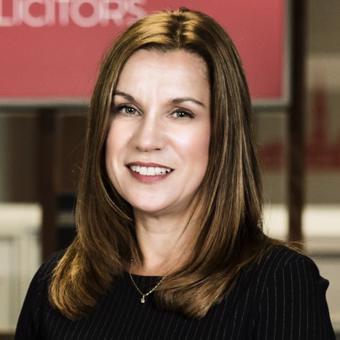In the hot seat is Louise Gill. Having spent time in Private Practice with DLA and Gateley, her first in-house move was to Coventry Building Society in 2019 as Lead Counsel before joining Belmont Finance in March ’21 as their Head of Legal (Commercial and Product).
In this series, BCL Legal Co-Founder and In-house Managing Director, Mark Levine, finds out a bit more about how lawyers who work in-house have got to where they are, what they do, what they feel are important character traits to have... and what lawyers considering a move in-house should think about!
Louise, tell us more!
What / Who made you consider law as a career?
I remember wanting to be a “femmes d’affaires” (business woman) in French lessons in high school. I was also very interested in psychology and people. I think it’s fair to say, I had a number of interests and it certainly wasn’t “law or nothing”. I did various work experience placements in small law firms and elsewhere throughout high school and university, including one with Deloitte, which was helpful in narrowing down potential career options (mainly that I was not made to be an accountant).
I chose to do a law degree because I thought that it could lead to a career in law but could also open doors to other career options. I found myself enjoying my degree and started thinking about a career in law and that age old question of the Bar vs a law firm. In the end, I was put off attempting to become a barrister by my university tutor, so started applying for vacation placements. Ultimately it was the right decision, but probably not for the right reason. I wasn’t successful initially, but I persevered and ended up with a vacation scheme at DLA Piper, which I loved. When they offered me a training contract, I didn’t hesitate to accept.
It was only really when I was doing my training contract that I knew I was going to have a long-term career in law.
What do you enjoy most about working as an in-house lawyer?
It combines all the things that I’m interested in – law, business and psychology. I remember when I left DLA, a colleague said she hoped I found what I was looking for. I didn’t realise it at the time, but I now believe that working in-house was what I was looking for.
I’ve always wanted to be part of the action. As a private practice transactional lawyer, I would be very involved with a business for a period and get to know the client well, only for the transaction to complete. Sometimes I found disengaging with clients at that stage quite difficult because I had enjoyed it so much. I prefer to not only be involved in legal advice, but also in the decision making based upon that advice.
I can stretch myself in-house and add value in areas outside legal, which is more difficult to do as a fee earner.
What attracted you to work for your current company?
It was a combination of a promotion, the opportunity to work with my fantastic manager again and the exciting stage the business is at. As a growing organisation, I knew it would be fast paced (which suits me) and I would be able to get involved in new areas and opportunities. I felt that joining Belmont Green would push me forward in my development, which is always in the back of my mind.
What are the main deliverables of your role?
I would describe my overarching goal as to grow the Legal function; not in terms of people necessarily, but in terms of building relationships within the business and our colleagues’ understanding the purpose of the Legal function and managing legal risk. I am trying to weave this throughout the business and work collaboratively, so we can ensure we are advising and supporting the business where we need to be. In my mind, I can be the best lawyer in the world but if my colleagues don’t trust me enough to involve me in their work or listen to my advice, I can’t be effective.
What do you feel are the most important character traits of an in-house lawyer?
There are a variety of in-house lawyer roles, depending on the sector and size of the business and the subject area. You can find specialist and generalist roles and everything in between.
So I think it can suit a variety of characters, but the most important traits in my opinion are the ability to network, communicate and build trust; the confidence to stand your ground when needed (but without arrogance or a personal agenda – you have to focus on protecting the business); and an interest and enthusiasm to learn and try new things.
When / If you look for new team members – what is most important to you and why? Legal expertise or character?
Coming from my background (which was transactional roles in insolvency, restructuring and banking and client secondments), I would of course say that character is my primary motivator when recruiting, as well as fit with the team’s and business’ culture, over specialist expertise.
I transitioned into a new area of law without too many challenges, and I know that I can teach other people to do the same if they are willing to learn and be flexible. In my team, we cover such a variety of areas that some knowledge of a range of areas is an advantage over deep legal expertise (although we do all have a financial services background which is an advantage because it’s a highly regulated sector). However, I think I can say that if my colleague in the Legal team was recruiting a structured finance lawyer, her priority list would probably be different to mine.
What would you say to any lawyer considering a move in-house?
I would say firstly speak to people in-house, particularly if you don’t have prior experience. It is very different to private practice and there are certainly things I miss (marketing with clients being one of them).
You need to identify what your interests and strengths are, and then consider whether those things will be compatible with working in-house and, if so, what roles. For me, it allows me to manage having a young family in a way that would have been really challenging as a transactional lawyer, but if work/life balance was my only motivator, I know that I wouldn’t enjoy it as much as I do. It’s also very busy at times, so certainly not the easy alternative to transactional law.
And finally, don’t assume that you can’t do something because you don’t have direct experience. Be realistic but don’t limit yourself.
I am very grateful to the people who gave me my first in-house role, because they took a chance on me and it all stemmed from there. This is where a good recruitment agent can be an asset, because they will be able to open your eyes to potential opportunities and they know which businesses are open to a more varied background than others.
- Connect with Mark Levine on LinkedIn
- Connect with Louise Gill on LinkedIn











